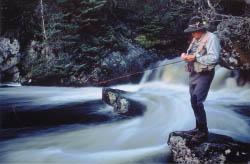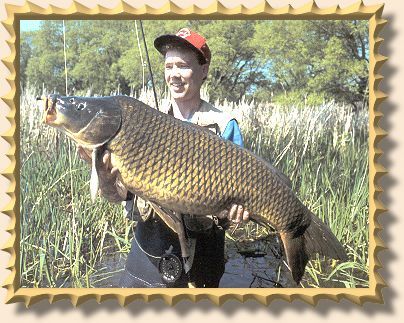Stalking Spring Carp

By Chris Marshall
May Morning
The water of the shallow cove was clear and unruffled, shimmering
in the morning sunshine. It was unusually hot for early May.
I was standing in the shallows of a wide bay, camouflaged
among the dry stalks of last year's cattails, absolutely
motionless. Across the bay something large sloshed on the
surface. Not yet - too far away.
Then - a subtle bulging of the water and a trembling of the
cattails to my right. And I saw them - three huge, blue-grey
shadows, fat as footballs, yet sleek, exuding power. Slowing
they came closer, foraging casually along the outside edge of
the cattails. I could make out the tubercles of their nostrils,
the occasional flash of orange-pink lips as one paused to pick
up something from the bottom, and the hint of bronze scales beneath
the dusky patina of their broad backs.
A gentle push on the rod, and the line curled out towards the fish
- now less than 15 feet away. The weighted nymph dropped a foot in
front in of the leader, barely rippling the water. By the
time the fish reached it, the nymph had almost touched the bottom.
There was no hesitation: the mouth opened, inhaled and the nymph
was gone.

Since I was a teenager, I've had this love affair with carp.
In the moorland streams of northern England where I grew up,
there was nothing to fish for but brown trout - wild, kaleidoscopic
creatures, perpetually hungry in the barely fertile, peaty
water. They were a delight to fish for, but rarely did
they exceed 10". It was inevitable that I should be drawn
to the ponds in the gentler lowlands to the east which had
been stocked with carp. As carp go, they were far from big,
but the five pounders we caught were ten times the size of our
local trout and they fought hard and long. I didn't fly fish
for them back then - that didn't happen until long after I'd
emigrated to Canada in 1960.

Like me, carp are immigrants. They've been on the move from
their homeland in Asia for centuries, arriving in Europe in
the Middle Ages in the backpacks of monastic aquaculturalists,
destined for ecclesiastical stewponds. They arrived in North
America about a century before I did, and today, the waters
are swarming with them.
In Canada, carp are found from Quebec to the Prairies. Many
anglers curse them; few fish for them; even fewer fly fish for
them. But those who do, have come to delight in the challenge
of seducing them into taking a fly and in the terrifying power
of their runs.

You can catch carp on flies wherever they swim - I even hooked
one on a Woolly Bugger when I was fishing for smallmouth in
the plunge pool of one of the dams on Ontario's Trent River.
They love warm water and are most active in the summer, but
they can be taken from May to September. Where I live in
Eastern Ontario, the Bay of Quinte offers superb carp fly
fishing. This long, shallow stretch of water is perfect
habitat for them. Fish over 20 pounds are common and there
are specimens over 40. Our biggest on the fly weighted in
at 38.5 pounds.
My favourite time to fly fish for them is in the spring, when
they move into shallow water prior to spawning. The water
warms up more quickly in the shallows, and the fish bask
there, soaking up the warmth, feeding on invertebrates in
the newly sprouting aquatic vegetation. In these conditions
they're particularly partial to an artificial nymph placed
strategically in front of them. ~ Chris Marshall
Continued next time.
|





